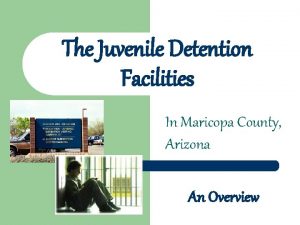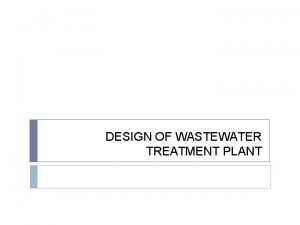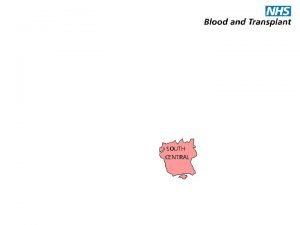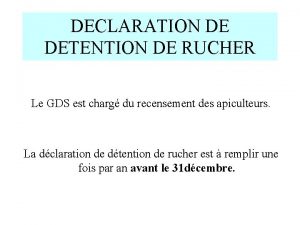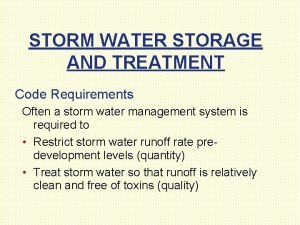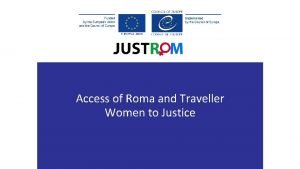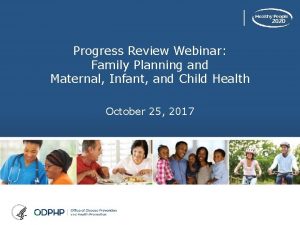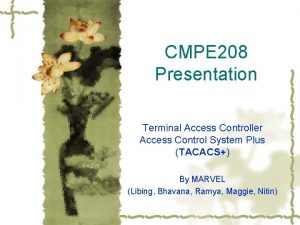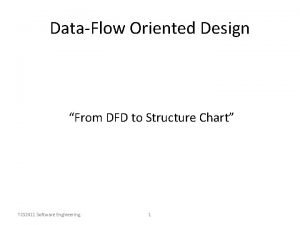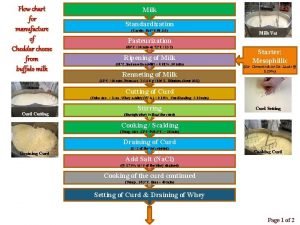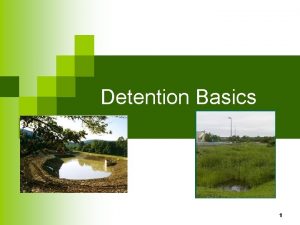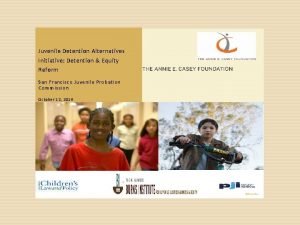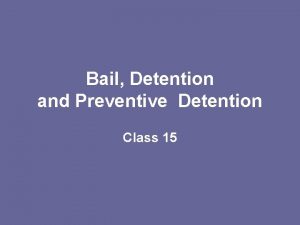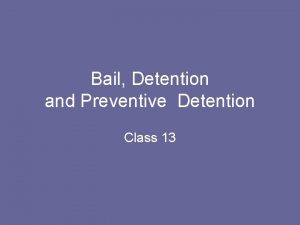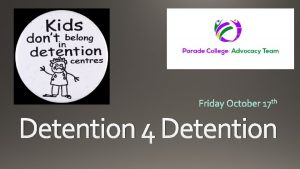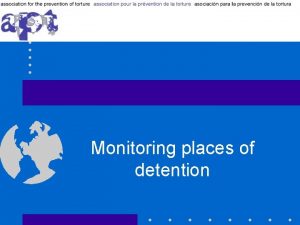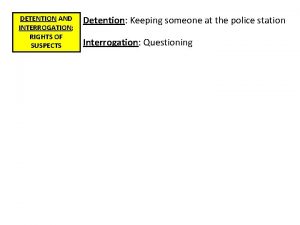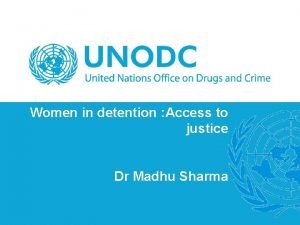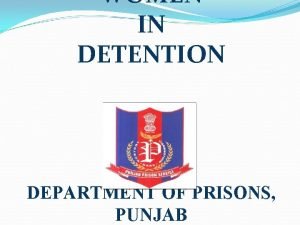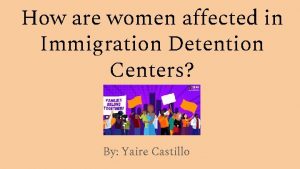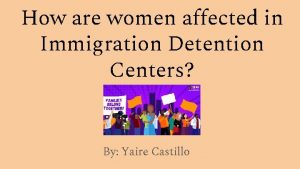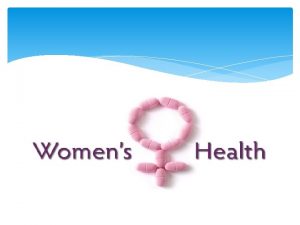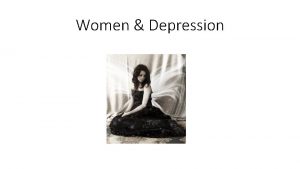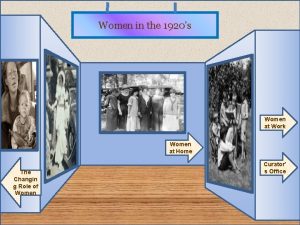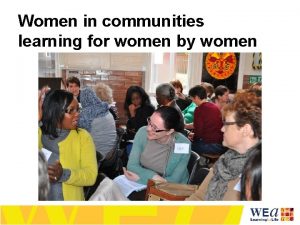Women in detention Access to Health Flow of




























- Slides: 28

Women in detention : Access to Health

Flow of presentation UNODC & ITS MANDATE UNODC FRAMEWORK FOR WOMEN IN PRISONS HEALTH RECOMMENDATI ONS IN BANGKOK RULES

WHO WE ARE? • UNODC was established in 1997 and Operates through regional country offices in over 130 countries • HQ in Vienna; Regional Office for South Asia in New Delhi, India

COVERAGE UNODC Regional Office for South Asia covers: Bangladesh, Bhutan, India, Maldives, Nepal and Sri Lanka Thematic coverage • Crime Prevention • Criminal justice, (Police reforms, Prison reforms, & Judicial reforms ) • Trafficking of women and Children • Drug control, • Transnational organized crime, Money-laundering, • Terrorism prevention

• Criminal justice, WHAT WE DO – Police reforms, – Prison reforms, – Judicial reforms • • • Trafficking in persons Drug control, Transnational organized crime, Money-laundering, Terrorism prevention Related international cooperation in criminal matters with operational field-level capacity. • Promoting health (prevention of drugs and HIV incl. in prisons)

Operationalization of Standards and Norms 20 September 2011 6

PERSONAL PROFILE • Less education • Economic lag • Socially marginalized • Inadequate livelihood skill • Disturbed family • Domestic violence • Sexual violence PHYSICAL CONDITIONS • Overcrowding • Poor ventilation • Lack of hygiene conditions • Less number of toilets • Lack of privacy • Inadequate sleeping amenities

VULNERABILITY FACTORS • Gender based violence and victimization from sexual or physical abuse prior to imprisonment can increase the risk of substance use and post-traumatic stress disorder or other mental health problems. • A high level of mental health-care needs, often as a result of domestic violence and sexual abuse; “ • Rates of post-traumatic stress disorder among women in substance abuse treatment range from 30 -59.

VULNERABILITY FACTORS • High level of drug or alcohol dependency in women prisoners than general population; • Drug-dependent prisoners are also at a higher risk of HIV infection, death resulting from overdose, compared to the general population. • The extreme distress imprisonment causes to women, which may lead to mental health problems or exacerbate existing mental disabilities;

• Nutritional status • Pregnancy( Antenatal, labor, and post partum • Contraception • Breastfeeding • Child care • Unwanted pregnancies • • • HIV STI Syphilis Gonorrhea Hep C • • REPRODUCTI VE PHYSICAL SEXUAL MENTAL Tuberculosis Anemia Bone weakness, fatigue • Substance abuse • Drugs • GBV

WOMEN IN DETENTION: UNODC FRAMEWORK FOR GENDER SPECIFIC HEALTH SERVICES 11

Women offenders and prisoners • United Nations Rules for the Treatment of Women Prisoners and Non-custodial Measures for Women Offenders—“the Bangkok Rules” (2010) • Updated Model Strategies and Practical Measures on the Elimination of Violence against Women in the Field of Crime Prevention and Criminal Justice (2010) • Supplement the UN Standard Minimum Rules for the Treatment of Prisoners (‘the Nelson Mandela Rules”)

6. Health-care services (a) Medical screening • Comprehensive health screening of women prisoners to determine primary healthcare needs, and specific • (a) The presence of STIs or BB; and, for HIV(after risk analysis), with pre- and posttest counseling; • (b) Mental health-care needs, including posttraumatic stress disorder and risk of suicide and self-harm; • (c) The reproductive health history of the woman prisoner,

Cases of sexual abuse • 7. 1 In case of sexual abuse, the woman prisoner shall be informed of her right to seek recourse from judicial authorities, fully informed of the procedures and steps involved. If the woman prisoner agrees to take legal action, Prison authorities shall help such women to access legal assistance. • 7. 2. Whether or not the woman chooses to take legal action, prison authorities to ensure access to specialized psychological support or counselling.

• R 8; Right to medical confidentiality, including specifically the right not to share information and not to undergo screening in relation to their reproductive health history, shall be respected at all times. • R 9; If the WP is accompanied by a child, that child shall also undergo health screening, preferably by a child health specialist, to determine any treatment and medical needs. Suitable health care, at least equivalent to that in the community, shall be provided.

Profile • Initial health screening and evaluation • The prisoner as patient has the right to confidentiality and to treatment and care that is subject to informed consent. • Prison health staff should make arrangements for continuous access to care on transfer or on release, • Prison health services should not be isolated but should be integrated into regional and national health systems.

• HIV counseling and testing with adequate protection of confidentiality and consent, the provision of antiretroviral treatment and treatment for opportunistic infections such as tuberculosis (TB) and of psychosocial support for the inmates • comprehensive strategy in response to HIV in prison settings • Health care service providers should be trained to follow the guidelines of universal precautions to prevent the transmission of HIV through medical practices (injections,

(b) Gender-specific health care • R 10 1. Gender-specific health-care services at least equivalent to those available in the community shall be provided to women prisoners. • R 10. 2. examination and treatment by a woman physician or nurse, a woman physician or nurse shall be made available, to the extent possible, except for situations requiring urgent medical intervention.

• Rule 11 1. Only medical staff shall be present during medical examinations unless the doctor requests a member of the prison staff to be present for security reasons or the woman prisoner specifically requests the presence of a member of staff • 11. 2. If it is necessary for non-medical prison staff to be present during medical examinations, such staff should be women and examinations shall be carried out in a manner that safeguards privacy, dignity and

(c) Mental health and care • Rule 12 Individualized, gender-sensitive, trauma-informed and comprehensive mental health care and rehabilitation programmes shall be made available for women prisoners with mental health-care needs in prison or in noncustodial settings. • Rule 13 Prison staff shall be made aware of times when women may feel particular distress, so as to be sensitive to their situation and ensure that the women are provided appropriate support.

(d) HIV prevention, treatment, care and support Rule 14 • programmes and services shall be responsive to the specific needs of women, including prevention of mother-to-child transmission. • In this context, prison authorities shall encourage and support the development of initiatives on HIV prevention, treatment and care, such as peer-based education.

(e) Substance abuse treatment programmes • Rule 15 Prison health services shall provide or facilitate specialized treatment programmes designed for women substance abusers, taking into account prior victimization, the special needs of pregnant women and women with children, as well as their diverse cultural backgrounds.

(f) Suicide and self-harm prevention Rule 16 Developing and implementing comprehensive policy of mental health care in women’s prisons strategies, in consultation with mental healthcare and social welfare services, • to prevent suicide and self-harm among women prisoners and • providing appropriate, • gender-specific and • specialized support to those at risk

(g) Preventive health-care services • 17. Women prisoners shall receive education and information about preventive health-care measures, including on HIV, sexually transmitted diseases and other blood-borne diseases, as well as gender-specific health conditions. • 18 Preventive health-care measures for prevention of breast and gynaecological cancer

3. Pregnant women, breastfeeding mothers and mothers with children in prison • 17. 1 To receive advice on their health and diet under a qualified health practitioner. Adequate and timely food, a healthy environment and regular exercise opportunities shall be provided free of charge • 17 2. WPs shall not be discouraged from breastfeeding their children, unless there are specific health reasons • 17. 3. The medical and nutritional needs of WPs in post natal stage shall be included in treatment programmes

9. Institutional personnel and training • R 33 a. All staff assigned to work with WPs trained on gender-specific needs and human rights of women prisoners. • b. Basic training on women’s health, in addition to first aid and basic medicine. • c. Where children are allowed to stay with their mothers in prison, awareness-raising on child development and basic training on the health care of children

9. Institutional personnel and training • R 34 Capacity-building programmes on HIV prevention, treatment, care and support. HIV/AIDS, issues such as gender and human rights, with a particular focus on their link to HIV, stigma and discrimination, shall also be part of the curriculum. • R 35 Prison staff shall be trained to detect mental health-care needs and risk of selfharm and suicide among women prisoners and to offer assistance by providing support and referring such cases to specialists.

Thanks
 Detention slips
Detention slips Sef juvenile detention
Sef juvenile detention Settling tank design
Settling tank design Norcor juvenile detention
Norcor juvenile detention Stationhouse detention
Stationhouse detention Trish collins nurse
Trish collins nurse Transflo desktop
Transflo desktop Seminole county juvenile detention center
Seminole county juvenile detention center Déclaration de détention de ruches
Déclaration de détention de ruches Retention vs detention pond
Retention vs detention pond Coefficient of detention
Coefficient of detention Women access to justice
Women access to justice Women's health alliance
Women's health alliance Borrego urgent care cathedral city
Borrego urgent care cathedral city Terminal access controller access control system
Terminal access controller access control system Terminal access controller access-control system
Terminal access controller access-control system Magic box respiratory
Magic box respiratory Venturi mask vs face mask
Venturi mask vs face mask Non rebreather mask nursing considerations
Non rebreather mask nursing considerations Definition of turbulent flow
Definition of turbulent flow Internal vs external flow
Internal vs external flow Energy naturally flows from warmer matter to cooler matter.
Energy naturally flows from warmer matter to cooler matter. Oikos meaning
Oikos meaning Transform flow and transaction flow in software engineering
Transform flow and transaction flow in software engineering Transform flow and transaction flow
Transform flow and transaction flow Irrotational flow
Irrotational flow Internal flow and external flow
Internal flow and external flow Data flow vs control flow
Data flow vs control flow Cheddar cheese flowchart
Cheddar cheese flowchart

